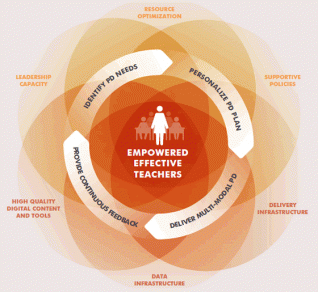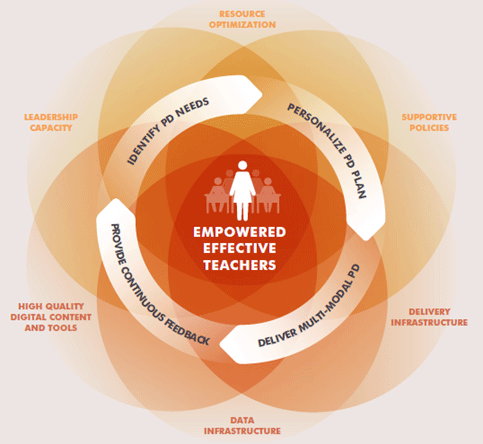An Introduction to MDRC’s Evaluation of the Innovative Professional Development Challenge

The Bill & Melinda Gates Foundation has recently made investments in a number of school districts and networks, helping these districts redesign their teacher professional development systems to better support teachers in increasing student success. MDRC has partnered with the foundation to evaluate this initiative, referred to as the Innovative Professional Development (iPD) Challenge, in five school districts. This Issue Focus introduces the iPD Challenge and MDRC’s study of the initiative and presents some early findings.
Investing in Instructional Support Systems
Over the last two decades, educational reforms have focused on the creation of higher academic standards for students, with the Common Core State Standards representing the most recent move in that direction. These reforms are accompanied by the expectation that teachers will improve the quality of their classroom practice. Successful implementation of these standards, therefore, is likely to rely on building educators’ capacity to improve student outcomes. However, there is considerable agreement among both practitioners and researchers that there is a shortage of high-quality learning opportunities available to teachers in American schools. Through the iPD Challenge, the Bill & Melinda Gates Foundation supports the redesign of instructional support systems to help improve educator effectiveness.
The iPD Theory of Action

iPD Challenge Theory of Action
As depicted in the figure, the iPD Challenge Theory of Action posits that educator support systems can create empowered, effective teachers by establishing a cycle that identifies teachers’ professional development (PD) needs, personalizes PD plans (matching PD to teacher needs), delivers multi-modal PD opportunities (including both individual and collaborative activities), and provides continuous feedback on teacher practice. To enable this cycle, this system must be supported by strong leadership, supportive policies, optimized resources, and high-quality content, data, and delivery methods. As a result of creating a support system with these features, teachers should experience PD that is more collaborative and better matched to their needs, which should lead to improvements in teachers’ engagement in PD and to higher levels of social capital in schools (for example, collective responsibility, trust among teachers, and norms about teaching resulting from regular professional interactions with colleagues). Previous work suggests that improvements in these outcomes could ultimately support improvements in instructional practice and student achievement.
Studying the iPD Challenge
To study the iPD Challenge Initiative, MDRC will examine the changes in PD support systems adopted by a subset of participating districts and the subsequent changes in teacher PD opportunities and experiences. While previous research suggests that the iPD Challenge could affect teachers’ engagement in PD, social capital, and instructional practice, the initiative’s elements have not been implemented together at a substantial scale, which underscores the need for evaluation. Over three academic years in five iPD Challenge districts, MDRC’s work will help answer three research questions:
-
What systems-changes take place as part of districts’ implementation of their iPD Challenge plans?
-
How do teacher professional development opportunities and patterns of participation change during the implementation of iPD, for individuals and groups of teachers?
- How do teacher engagement, social capital, and instructional practice change during the implementation of iPD?
To answer these research questions, MDRC will conduct surveys, focus groups, and interviews; analyze administrative records; and review key documents. After establishing baseline measures of current professional development practices and key teacher outcomes — including teacher participation and engagement in PD, social capital, and instructional practice in each district — MDRC will update these measures in subsequent years to allow for an assessment of each district’s progress relative to its own baseline. MDRC will supplement district-wide analyses with learnings from case studies of schools and teachers in the districts. Throughout the project, MDRC will provide regular reports and feedback to the foundation, participating districts, and the broader field.
Early Findings on Teachers’ Professional Development Experiences Prior to iPD Implementation
MDRC surveyed teachers about their PD experiences prior to the implementation of the iPD Challenge. These baseline measures help inform the research team’s understanding of the existing contexts in which iPD is being implemented. Key highlights from the baseline survey include:
-
Responding teachers suggested that their choice of or assignment to PD was driven largely by priorities or requirements set by the school or district and by self-identified needs or interests; needs identified through formal observation or feedback on their teaching had a small influence.
-
Forty percent of responding teachers wanted more time for PD, and 65 percent wanted to participate in different PD opportunities. Teachers’ primary reasons for not participating in more or different PD activities were that some PD opportunities were too expensive, that available PD activities did not meet their needs, and that they did not have enough time to participate in more or different PD opportunities.
-
Eighty-five percent of responding teachers reported engaging in formal collaboration opportunities with colleagues, and most reported that collaboration was useful to improving their practice. Further, half reported wanting additional time for collaboration with other teachers.
Overall, a key theme that emerged from the baseline teacher survey is that teachers value collaboration with colleagues and desire more time for professional development. Many of the iPD districts’ proposals included plans to address these factors as they redesign their teacher support systems. Over the next three years, MDRC will continue to examine professional development opportunities and experiences as iPD rolls out. The iPD Challenge Evaluation team’s next Issue Focus, available in early 2015, will discuss emerging themes regarding implementation of the iPD Challenge Theory of Action.







